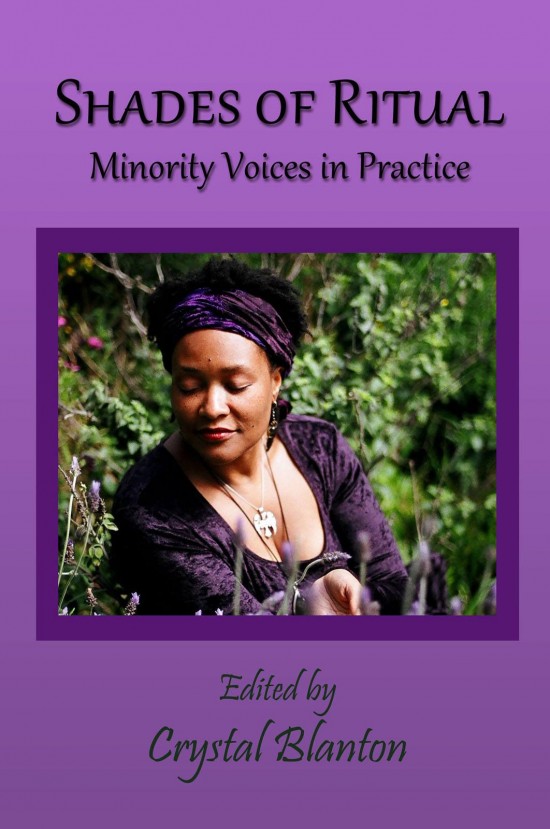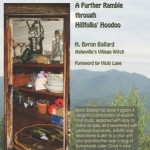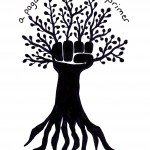 Shades of Ritual: Minority Voices in Practice
Shades of Ritual: Minority Voices in Practice
Immanion Press, 2014
Edited by Crystal Blanton
Contributors: Nadirah Adeye, Clio Ajana, Crystal Blanton, Flame Bridhesdottir, Leslie Brooks, Janet Callahan, Alexandra Chauran, Dr. Katharyn Privett-Duren (Seba O’Kiley), Yutaka Furuki, Abel R. Gomez, Olivia Haynes, Yvonne E. Nieves, Luna Pantera, Nathaniel Puckett, Rt. Rev. Anniitra Ravenmoon, Sandra Santiago, Szmeralda Shanel, Rose Skye, Jayde Van Ter Pool, Pablo Vazquez III, Heaven Walker, Cecily Joy Willowe, M.Div., and Alisa Kuumba Zuwena
I felt, like many Black Americans, that I had no place on this earth to call my own. I was not seen as African or American. Wicca showed me that I did not need a place on a map to call my origins. It would be nice, but I belong to nature, the earth, the Goddess. Wicca made the ground, the skies, the stars, and the universe my home.” – from “Black Wicca: On Becoming a Womanist Wiccan” by Cecily Joy Willowe, M.Div.
This is the second installment in the Shades of Faith series, and brings together a diverse array of authors from different traditions and backgrounds who are at different stages in their respective paths, from young people still questing to those reflecting on a lifetime of Pagan practice. The strongest offerings combine a depth of knowledge with a solid grounding in the personal experiences of the authors, all of whom are Pagans of color.
There’s a certain danger when writing from a perspective shaped by gender, ethnicity, sexual orientation, or the like, that only people who share your experiences will read it and you will wind up preaching to the choir. I’m sure other Pagans of color will find much that they relate to and recognize (and some things they don’t, particularly…the world is a big place). But everyone else ought to read it as well.
For one thing, human experiences are strangely resonant with one another. Anyone who, like Cecily Joy Willowe, has ever felt out of place or realized slowly that the thing you love lacks something important will recognize themselves in her contribution, and perhaps take heart from her resolve. Her essay on bringing Womanist theology to Wicca is an extended meditation on not just finding spiritual nourishment, but making it. Likewise, when reading “The Other Southerner” I felt a strong sense of recognition…I too live in the South, which is maddening, complicated, and home. More than one author was either raised in small “t” traditional witchcraft practices or has sought them out as part of his or her spiritual journey, or both. Szmeralda Shanel’s descriptions of her evolution from a “priestess” to a “spiritual worker” made me nod, as did her experiences with bossy Ancestors and letting Jesus back in her house. Other people’s relationships with deities and the sometimes sudden sharp turns of a spiritual life made me smile or wince accordingly.
There were other wince-worthy experiences I can only relate to by extrapolation or comparison. More than one author described continual assumptions that he or she “belonged” somewhere else…usually somewhere more, you know, African. The tendency to want our religion to match our genes, and our genes to match our appearance, is widespread and troubling. Issues of cultural appropriation get a nuanced treatment, again from more than one author. Nadirah Adeye talks about the toll that the continual stress of racism takes on black women’s health…and offers an antidote in self-care and sacred sensuality in ritual. Pagan religions have a race and class problem at times; we are more a reflection of the larger society than we might prefer. That information should not shock anyone or make them defensive; it should merely make them want to do something about it. Reading the essays which deal with those topics and taking them to heart is one possible place to start.
Other essays I found interesting simply because they were about something I knew little about: Yutaka Furuki writes about being a Hermetic magician and a practitioner of the Northern (European) tradition in Japan, drawing comparisons to Buddhism and Shinto in the process. My own experiences with those things range from little to none, but I am definitely a fan of comparative religion and he made connections I would never have seen on my own.
Not having read the first in the series, I can’t say how this one compares. But while not every piece is equally strong, the ideas in Shades of Ritual are substantive and contribute valuable perspectives to the wider Pagan conversation, a lively mix of sharp scholarly observation, artistic expression, ritual, and wisdom woven from lived experience by authors I hope to see more from.
















